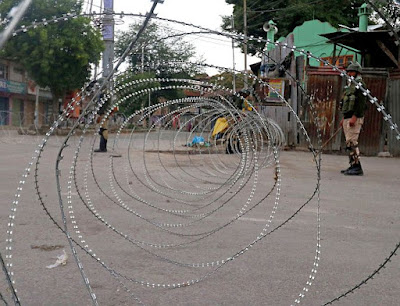Nationhood Conundrum
 "Nations are born in the hearts of the poets, they prosper and die in the hands of politicians", Allama Iqbal said.
"Nations are born in the hearts of the poets, they prosper and die in the hands of politicians", Allama Iqbal said.
A nation can be defined as a group of people having a same language and a similar culture residing at same place and era--thanks to political science. This group of people often requires a territory to establish a self-government for the self-help and very survival on the face of Earth as well as for a collective good and the order for its people. Without a sustainable order in society , an anarchy,whom Thomas Hobbes called a state of nature, sees the manifestation of pessimistic behavior of human nature and creating an unprecedented unrest which history of mankind has repeatedly seen. These nations, consisting of a uniform ethnic societies, are more often prone to settle their disputes amicably and results in building a national government for them. On the other hand, post-colonialism saw a series of independent nations which were nowhere in history and had the serious demographic fault-lines in them. These nations had irrational territorial divisions which separated different ethnic groups in different states. Now, all these unnatural states are a quagmire of unrest and social stratification: Middle East and African nations are witnessing the separatist movements on ethnic claims. In these states, the smaller ethnic groups blames the larger ones for resource plunder and exploitation.
Pakistan is one of them, facing a never-ending identity crisis and national integration. This crowd of more than 200 millions people could not make a national identity of Pakistanism. The Pakistanism where they would have Urdu as their 'proud' national language and mutual respect for eachother, and in addition, a healthy competition for a collective good and prosperity based on inclusiveness. Pakistanis are still confused at their nationalism, whether they're Punjabis, Sindhis, Balochs, and Pathans based on their 'proud' ethnicity or they're Brelvis, Wahabis, deobandi and Shias based on their self-proclaimed 'righteous' model of Islam. They are also hesitant over transnational pan-Islamism as their ideology as proposed by the national poet. These poor Pakistanis are also confused over another enigmatic situation: they are Pakistanis first and Muslim second and vice versa. Therefore, it has seen linguistic based movements for separation and rights as well as ethnic based opposition to national development projects. This vicious cycle of missing nationhood remind us again and again of our directionless journey of 70 years.
This national integration issue would have dealt with prudence if we had acted upon the advice of our ideology driver-- Sir Syed Ahmad Khan. After Urdu-Hindi controversy, he affirmed the Hindus and Muslims as two nations on culture and language lines. He asked Muslim nationalists to instill nationalism by providing a uniform national education. The national education would have been the answer of Pakistan nationhood conundrum. This would have resulted in the societal cohesion, communal harmony and national integration. What do we educate our generations in syllabus? Where do we educate our youth? How do we educate them? We have madrassa for non-afforders, Urdu medium for 'low' caliber students, English medium for 'high' caliber students, and a Oxford educating system for elite class' progeny. How come will we able to produce a collective uniform narrative against challenges amongst our new generation. We will hardly be able to stand against the contemporary challenges in this globalized world and for national collective goals.
Moving forward, different international watchdogs and strategic studies institutes have nudged us on our biggest problem haunting us in our very near future : the water scarcity. Pakistan is the third most water stressed nation in the world and going to be affected by it from south to north , from glacier residers to dessert dwellers. Moreover, we will face dire consequences in economic growth stalemate as our economy is widely water dependent. Along with this, Pakistan is also one of worse target of global warming. Time clock is ticking very fast in case of Pakistan and this water bomb is more destructive than the nuclear one. To face this problem, we need a nationwide cohesion and will. But thanks to our divisions we could not prepare a popular movement against the national problems. In my wishful thinking, we will plant millions of trees on our own as the precedent set by Ethiopia. We will not waste water and vote on pressing issues like dams. We will close the tap while brushing our teeth as well as during dish washing and so on and so on. In the nutshell, my wishful-thinkings will remain the wishes unfulfilled until or unless we pay heed on our real issues like national education.


I agree with you.great👍
ReplyDeleteIt was an exceptionally well-written article.I particularly liked the fact that it was an objective look at the issue:
ReplyDeleteWhat do we educate our generation in sallybus?
Our school system is discriminatory nd it is literally terrible for the future of beloved Pakistan. Secondly you picked a great issue about nationalism; Pakistan which has around a dozen ethnic and lingual groups and few religious communities.And face serious issues among them. One should have real spirit of Islam as we've learnt it from the Holy Quran
" *_O people, We have created you male and female and made you into nations and tribes that you may know one another. Verily, the most noble of you to Allah is the most righteous of you. Verily, Allah is knowing and aware_*."I consider your opinions admirable for the parallel development of Pakistan that we should save water and plant trees. Here, I'm adding more services that literally Pakistan needs nowadays; follow traffic rules, mainten cleanliness, save electricity nd fuel, help (any needy around you, rather than waiting for anyone else to do so), don't keep silence when you think or feel any thing wrong going on around you etc.
Keep it up Adnan Aslam 👍